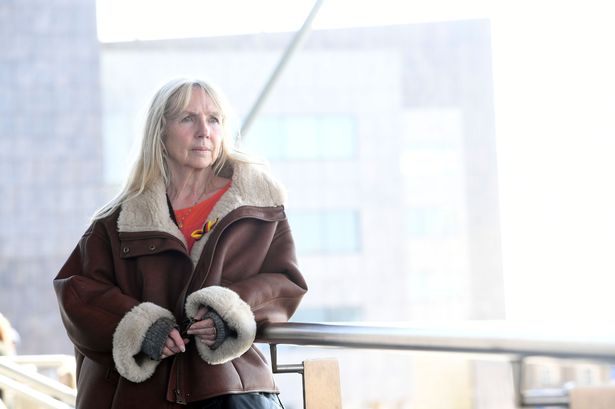Her family believe she died of aids after becoming a victim of the infected blood scandal but they are facing major barriers to securing compensation over the tragedy Suzanne Morgan, who is one of the campaigners in the infected blood scandal, which caused the death of her mother(Image: WalesOnline/Rob Browne)
Suzanne Morgan, who is one of the campaigners in the infected blood scandal, which caused the death of her mother(Image: WalesOnline/Rob Browne)
When Mari Jupe had gallstones she went for treatment at Wales’ largest hospital – University Hospital of Wales in Cardiff. But just before her release she was told she was anaemic and would be given two pints of blood.
After the first pint she began having a poor reaction, but was reassured that was normal and was given a second pint. Nine months later she died, aged 68, having – her family believe – been infected in hospital with aids. In the months before her death, her body broke down, she was covered in sores, fatigued.
When her children took her for a day out on her 68th birthday she was unable to leave the car.
Her graphic, painful death, was ten days after that birthday in 1991 and nine months after receiving the blood transfusion.
Mari, from Cardiff, is one of the victims of the infected blood scandal. For our free daily briefing on the biggest issues facing the nation, sign up to the Wales Matters newsletter here
Her death certificate doesn’t mention aids, but does say she had hepatitis C nine months after being given infected blood.
Her daughter, Suzanne Morgan, explained: “They gave her one pint and she nearly passed out, my sister was with her and then they said, oh, this normally happens, and then they gave her another pint. From then onwards, for the next few months, her body started to break down. We believe she had aids.”
“She was covered in sores, she was totally fatigued. She died ten days after her birthday. On her birthday we took her out, but she stayed in the car and slept.
“The day she died she basically haemorrhaged up her liver.”
Suzanne’s father called her to tell her she needed to see her mum but she was on bed rest, having just found out she was pregnant, “but if I didn’t go in, I wouldn’t have seen my mother,” she said.
After her death, no postmortem was carried out, as Suzanne believes should have happened, and her body was sealed in a bag and put in a closed coffin, her family unable to see her.
Hepatitis C is primarily transmitted through blood-to-blood contact, such as sharing needles or through contaminated medical equipment.
Before 1996, an estimated 30,000 people in the UK were given contaminated blood transfusions and blood products infected with hepatitis C , hepatitis B and/or HIV. More than 3,000 people have died as a result, and thousands more live with on-going health complications.
Blood donations were not routinely screened before September, 1991.
“She went in for gallstones, and got Hepatitis C. You can only get Hepatitis C with infected blood, so how did she pick that up?” asked Suzanne.
She is one of the many who continues to campaign, most recently at an event at the Senedd. Her family are one of those who are considered an “affected” group in terms of compensation.
A decade ago they prepared statements and have then searched and requested copies of her mother’s medical records. But these no longer exist.
While they have applied to the compensation scheme, that lack of medical records – and a tickbox approach – means Suzanne said they were rejected out of hand.
And yet, she is one of those continuing to campaign despite them being “at the back of the queue”.
“My mother was not a haemophiliac. They killed her,” claimed Suzanne.
It is important for her to get answers. “She was killed by the government. Who is to blame, who is culpable? How dare they say, ‘well, you haven’t got records’ we don’t because they destroyed them and then, of course, it crossed a period when everybody went from physical ledgers etc, to digital. When I went to the funeral home in Cardiff, they’d burnt them,” she said.
“Remembering where this blood came from, arm to arm from prisoners in America, not screened, hence why my mother had a bad reaction being given it. They bought all this cheap blood and practically used up all their supplies whereas other countries acted before our country.”
A long-running and painful exercise has been fought by victims, their families and supporters to investigate what happened and deliver them compensation.
An independent inquiry has taken months of evidence and reported its findings. The UK Government has a compensation scheme to provide financial compensation to victims of the infected blood scandal, but victims feel it is too bureaucratic and set up to block payments.
The stories of those impacted by the infected blood scandal
The infected blood scandal is just that, a scandal.
Before 1996, an estimated 30,000 people in the UK were given contaminated blood transfusions and blood products infected with hepatitis C , hepatitis B and/or HIV.
More than 3,000 people have died as a result, and thousands more live with on-going health complications.
The independent inquiry found infections were caused needlessly to people because there wasn’t enough screening in place. Blood was collected from prisoners in US prisons, despite knowing infection rates were higher in these blood donations. There wasn’t universal screening of blood and patients weren’t warned of the risks of transfusions.
Some of those given transfusions had no real clinical need.
Here are some of those stories:
In his first hours in office last July, Prime Minister Keir Starmer said paying that money was “very important” but the victims, both those infected and affected, said too little progress was being made.
Labour MS Julie Morgan asked Jeremy Miles, Wales’ health minister, to put pressure on the UK Government to speed up payments.
She said: “On May 20 it will be one year since Sir Brian Langstaff published his final inquiry report, in which he highlighted his damning findings. And we are now expecting him to report again, outlining his concerns about the completely unacceptable delay in setting up the Infected Blood Compensation Authority, and issuing compensation to victims. This should not be happening.
“Last year we were so pleased to welcome the news that £11.8 billion had been set aside for compensation. But I can’t support the way in which the setting up of the compensation framework, and the Infected Blood Compensation Authority, has caused significant delays, and the delays in registering for the affected.”
Two people are dying every week while they wait for compensation and 25 infected or affected people that were known to Haemophilia Wales have died since the inquiry began.
Health minister Jeremy Miles responded: “In my discussions with the UK Government, who obviously are responsible for the scheme, as she clearly is aware, I’m informed that the IBCA are still building and testing their compensation service, and they are working to start claims for estates, affected people and infected people who are not registered with the support scheme, with the aim of starting payments to some people in all of these groups by the end of this year. They won’t have finished paying people in these groups in that time frame, but they will have started.
“Across all the infection groups, when they open, they will prioritise claims for those who are nearing the end of their life. This is for those who have been told by a medical professional that they might have 12 months or less to live.
“During April, I’m informed that they will write to everyone who’s registered with the support scheme to confirm that they have their correct details and to explain how to contact them if prioritising end-of-life claims applies to them.
I’m also aware that the IBCA is recruiting hundreds of claims managers at the moment to help with compensation claims as soon as possible.”
